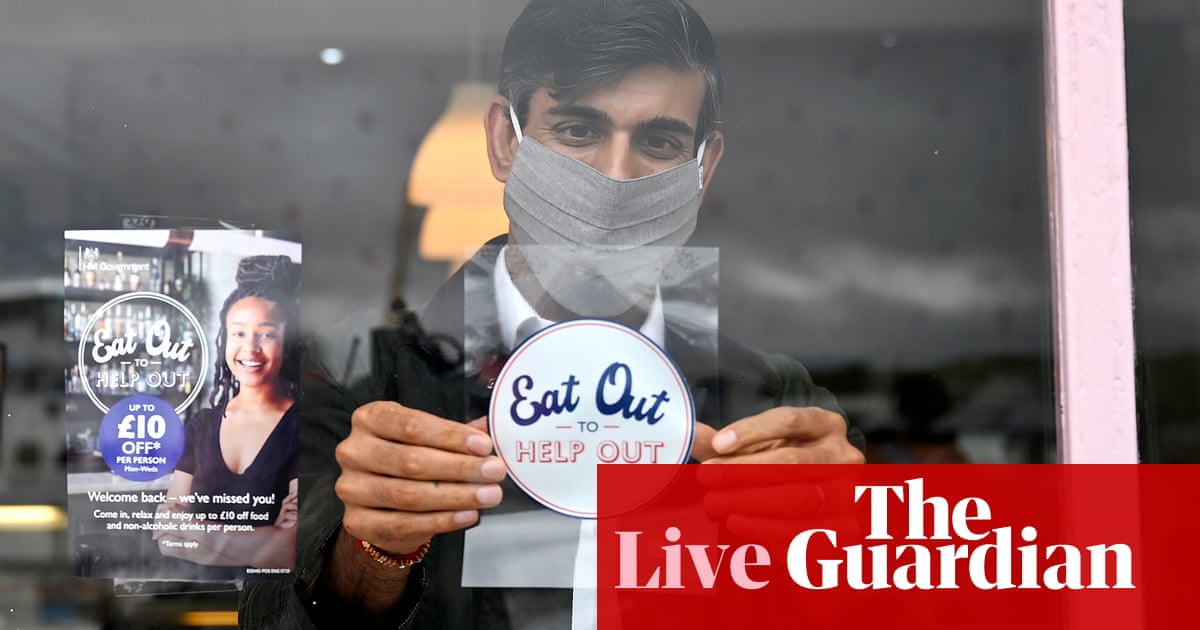
Britain’s economic recovery from the coronavirus pandemic slowed in August despite the government’s “eat out to help out” scheme fuelling a rise in consumer spending.
The Office for National Statistics (ONS) said gross domestic product rose by 2.1% in August compared with the previous month as the rebound faltered in the late stages of summer before new restrictions were imposed, falling short of expectations among City economists for a monthly growth rate of 4.6%.
It followed growth of 6.4% in July, revised down from 6.6%, 9.1% in June and 2.7% in May.
Continuing a fightback from the deepest recession in history for the fourth consecutive month as people increased their spending in hotels, cafes, restaurants and pubs, the latest snapshot comes as concerns mount over the strength of the UK’s economic fightback as the second wave of coronavirus infections spreads and the government imposes tough new restrictions on business and social life.
After staging a rapid recovery in recent months, GDP is 21.7% higher than its lowest ebb during lockdown in April, when the economy contracted by 19.5%. It remains 9.2% below pre-pandemic levels, however, and could take years to recover while the virus and efforts to contain its spread continue to drag down activity.
The official figures were released hours before the chancellor, Rishi Sunak, announced the expansion of wage subsidies for workers at companies forced to close under new lockdowns.
“Today’s figures show our economy has grown for four consecutive months but I know that many people are worried about the coming winter months,” he said. “Throughout this crisis my single focus has been jobs, protecting as many jobs as possible and providing support for people to find other opportunities where this isn’t possible. This goal remains unchanged.
“That’s why we’re investing billions to help people back to work and provide fresh opportunities to those that have sadly lost their jobs, so that nobody is left without hope.”
The ONS said more than half of growth in August was fuelled by the sector of the economy that includes hotels and restaurants, as the combined impact of lockdown measures being relaxed, the eat out to help out scheme and more people taking holidays in Britain boosted consumer demand.
Highlighting the impact of “staycations” as international travel restrictions provided a shot in the arm for domestic tourism, the ONS said growth in the accommodation industry leapt by 76% on the month. Fuelled by a boom in diners taking advantage of early-week government discounts, the food and beverage service activities industry grew by 69.7%.
Activity across the services sector as a whole remains about a tenth below the level in February, however, as the impact of the pandemic continues to weigh down Britain’s economic recovery. Recent growth indicators, such as business surveys, high street footfall and traffic data, also indicate a sharper slowdown over recent weeks.
The ONS said the production sector of the economy – which includes energy, mining and manufacturing – grew by 0.3% on the month, and the construction industry by 3%. Both sectors, however, remain below pre-pandemic levels.
Analysts expect the UK economy to struggle for growth in the months ahead as the second Covid-19 wave takes hold and the government scales back its support for jobs by closing the furlough scheme and replacing it with a less expensive job support programme.
Ruth Gregory, the senior UK economist at the consultancy Capital Economics, said it could take until late 2022 for a return to pre-pandemic levels of GDP. “We expect the new Covid-19 restrictions to mean that the economy does little more than move sideways in the final three months of the year, leaving economic activity marooned 7.5% short of its pre-crisis level,” she said.












